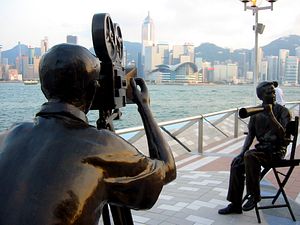A film predicting a dystopian future for Hong Kong under Chinese rule won the top prize at the prestigious Hong Kong Film Awards on Sunday, despite having its release curtailed after raising ire in Beijing.
Ten Years presents five vignettes in Hong Kong as imagined in 2025 – 10 years after the film’s release in 2015. The film gives force to Hongkongers’ darkest fears about cultural marginalization and political oppression by the Chinese central government. In one of the stories, government officials plan a assassination plot by “terrorists” to try and win public support for a National Security Law. Another vignette shows speakers of Cantonese – the local dialect in Hong Kong — being marginalized and discriminated against by speakers of Mandarin, China’s national language. The film also foresees self-immolation protests coming to Hong Kong, along with Red Guard-style children dubbed “Youth Guards” who terrorize local businesses for breaking government-imposed taboos.
Though the film was never distributed in the mainland, it was a surprise hit in Hong Kong, famously beating out global juggernaut Star Wars: The Force Awakens at the one theater where it initially opened. From December 24 through February 7, Ten Years was consistently ranked among the top ten films in Hong Kong in terms of weekend box office gross – despite never being shown on more than six screens. The film is no longer being shown in cinemas, but community organizers have arranged for public screenings (including 30 separate showings on April 1, two days before the Hong Kong Film Awards).
Ng Ka-leung, who came up with the idea for the film, explained to South China Morning Post that he “had been feeling dejected for years about the lack of future for Hong Kong”:
The national education controversy showed that the next generation are at risk of ideological indoctrination. Political, education and housing problems have festered for years and all protest movements have turned out to be futile in the end. I wanted to make a film to flesh out possible future scenarios so people might be goaded into thinking more about the future path Hong Kong should take.
The Hong Kong in Ten Years is a far cry from the sunny picture of “one country, two systems” that Beijing prefers. Thus, the film’s award led to some awkward coverage by mainland Chinese media outlets. Chinese media typically cover the Hong Kong Film Awards; in fact, an article in Xinhua on 2015 ceremony called the awards “the most prestigious movie awards in the region and one of the most recognized in the Chinese mainland and Taiwan.” Rather than not covering the “most prestigious move awards,” Xinhua and other Chinese media simply avoided ever mentioning which picture took home the Best Film award.
Xinhua revealed the winners for Best Screenplay, Best Actor, Best Actress, Best Director – but not Best Film. Other coverage avoided mentioning Ten Years by focusing on the grand success of Port of Call, which won awards for Best Actor, Best Actress, Best Supporting Actor, Best Supported Actress, and Best Screenplay. Meanwhile, CCTV had announced back in February – after the nominees were made public – that it would not the broadcast the awards, despite having shown every ceremony since 1991. FreeWeibo, a site dedicated to revealing censorship on China’s Twitter-like service Sina Weibo, reposted a number of messages, all since deleted by censors, announcing the Best Film award for Ten Years.
Even Baike, often called the Chinese Wikipedia, barely gave a nod to this year’s Best Film winner. It does list Ten Years in its run-down of winners and nominees, but does not mention the film once in the text of the article on this year’s Hong Kong Film Awards. Plus, Ten Years is notably the only film of this year’s winners that does not have its own separate Baike page.
The most notice Ten Years has gotten in mainland Chinese media was a screed in Global Times, dismissing the film as a “thought virus” and “completely absurd.”
Not everyone in Hong Kong was happy about the film’s award, either. Peter Lam Kin-ngok, chair of production company Media Asia – and a local delegate to the Chinese People’s Political Consultative Conference in Beijing – told South China Morning Post that the award was politically motivated. “Politics has kidnapped the profession and politicized film awards,” he said.
Crucindo Hung Cho-sing, chair of the Hong Kong Motion Picture Industry Association Limited, agreed with Lam’s take that Ten Years was undeserving of the victory. “It was not nominated for the best actor, actress or cinematography, so it doesn’t even match the standards of a best picture,” he argued.
Still, the media blackout on the mainland didn’t concern director Ng, who told AFP that the “movie was made for Hong Kong people.”
“If you ask me what Beijing might feel towards us, I would say it doesn’t really matter,” Ng said.
Meanwhile, producer Andrew Choi told AFP that the award for “Ten Years “shows Hong Kong still has hope. It reminds us that we could have courage to be creative.”

































